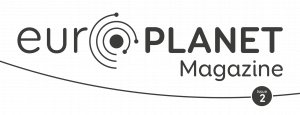The Last Word – Beyond Borders
The Europlanet Society’s President and Europlanet 2024 RI Coordinator, Nigel Mason, reflects on a milestone for the European planetary community.
Read article in the fully formatted PDF of the Europlanet Magazine.
The work discussed in this issue of the Europlanet Magazine has been performed amidst one of the gravest health crises of recent times. I find the ingenuity and the dedication shown by the planetary community in response to these challenging circumstances very inspiring.
Planetary science is a growing field across the world, with increasing numbers of countries developing their own space programmes. As we hear from Niklas Nienass MEP (page 28), these individual programmes need to be supported by cooperation and coordination at all levels, from grass-roots efforts to involve the wider community, to policy-makers building a robust legal framework. Through our Strategy for Global Collaboration and Integration, launched last December, Europlanet aims to support the creation of a more integrated and interconnected global planetary science community, and foster conditions for new scientific partnerships between EU and non-EU countries.
In 2021, we have strengthened our partnerships with Argentina, China and South Korea, opening up facilities in those countries for access by the European research community, and vice versa through reciprocal arrangements (page 30). The recent workshop in Botswana (page 6) is the first in a series to build collaborations with African colleagues, to exchange knowledge and to train local experts with the skills and technical capability to meet African goals for the development of space science. The past year has also been a showcase for the global nature of planetary exploration, with missions from China and the United Arab Emirates joining Indian, European and US spacecraft at Mars back in February, and the selection of complementary European and US missions to Venus in June.
Planetary science projects are amongst the longest-duration science endeavours currently undertaken by humanity, spreading over decades from conception, to design, launch and operation (as highlighted in the article on page 24). The doctoral candidates and postdocs of today, working on the first stages of a space mission, may be the operational scientists when the mission arrives at its destination. Europlanet therefore must ensure that we both attract and retain the best early career researchers. The vibrant Europlanet Early Career Network (EPEC) continues to grow and, through its activities (page 18), is supporting an increasingly diverse new generation of planetary scientists. I urge you to support EPEC by encouraging early career colleagues to join, or volunteering to become a mentor yourself. I am particularly delighted to see founding members of EPEC now taking on senior leadership roles in the Europlanet Society (Planetary Perspectives, page 21).
The benefits of collaboration and community support are clear from the impacts now emerging from the Europlanet 2024 Research Infrastructure (RI) and its predecessors (page 40). We are gathering evidence that the research infrastructure stimulates new areas of scientific activity that would not have come about without this sharing of facilities and expertise.
As we enter 2022, the European Commission’s Horizon Europe programme will bring many new opportunities for our community. The Europlanet Society will support you in forming consortia and writing proposals, and we ask that you help us in the Society’s growth and development by taking on roles within its organisation.
I wish you all a happy (and safe) festive season and hope to see you at a face-to-face Europlanet Science Congress in Granada in 2022.



